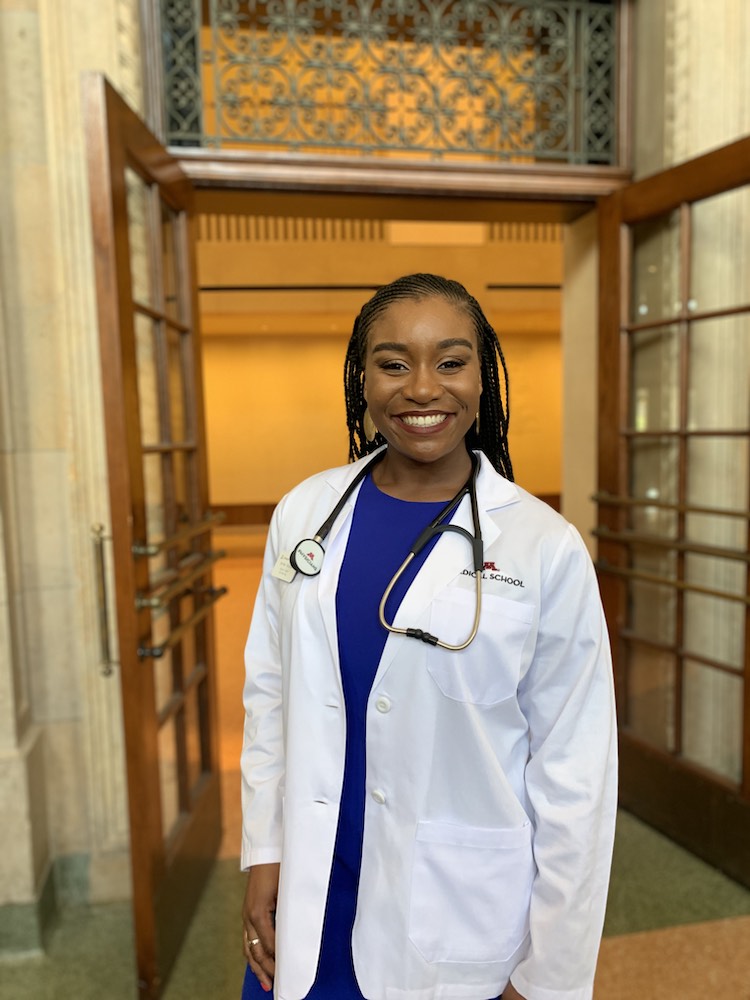Osereme (Reme) Abulu

Name: Osereme (Reme) Abulu
Graduating Class: Class of 2023
Undergraduate school attended and major: University of Minnesota; Neuroscience B.S., Spanish Minor
Languages spoken: Spanish (proficiently :) )
Favorite activities to do in the Twin Cities? Aerial silks, eat delicious food (especially on Eat Street or in Northeast Minneapolis on Central Ave).
Why did you choose the University of Minnesota Medical School and what do you like about it? I chose the University of Minnesota because it was the one medical school that took a chance on me and accepted me. I used to feel shame about only getting one acceptance, but realized that I ended up where I was meant to be! I like the dynamic of my class, we are really collaborative and supportive of one another's learning. We have mini rotations (POCC) starting in spring of 1st year, and I loved being able to see patients and start learning how to be a “real” doctor. When classes got hard, POCC was a great reminder of why I went to medical school. I also really like our clinical course Foundations of Clinical Thinking, it was a cool way to apply concepts learned in class to real life scenarios.
What would you change (areas of development) about the University of Minnesota Medical School? I have been doing a lot of work advocating for curricular changes, especially regarding incorporating topics around race, health equity, and social determinants of health more intentionally and consistently into students' learning. I think the school has work to do with this, but has made some great changes so far.
What is the relationship between the students and the surrounding community? Students get the chance to engage with "community teachers" through an interprofessional program called 1Health, and also have community engagement oriented longitudinal projects. There is always room to improve community engagement, especially in light of recent injustices in the Twin Cities, so the medical school has been trying to grow its community programming!
Have you participated in any student organizations? If so, why did you select those organizations and what has been your experience? I was the co-president of the Student National Medical Association (SNMA), general board member for White Coats for Black Lives (WC4BL), and a founding member of the MedEd Reform Student Coalition.
I chose to be part of SNMA because I was part of the Minority Association of Pre-Medical Students as an undergrad, and wanted to continue being part of the organization. I think SNMA provides great community and support to Black and POC students on campus, and we continue to try to advocate for curricular change, support for POC students at the UMN medical school, and engage with our greater Twin Cities community. Through SNMA I also served as a mentor for underrepresented undergraduate students to support them in their journey to medical school. Finally, SNMA provided an awesome opportunity to network with other like minded students in SNMA chapters around the nation!
I became part of WC4BL because I wanted to be in a group of students, who were interested in taking action in light of social issues. WC4BL is an organization dedicated to dismantling racism in medicine and uplifting Black people and other POC. The UMN Chapter organized a few protests after George Floyd’s murder, including one at the State Capital, at the Hennepin County Medical Examiners office, and at our own institution. My peers served as street medics, gave out medical supplies and food during protests, and did food runs for those in need. We did what we had to to support our grieving community amidst racial injustice and the COVID-19 pandemic. We spoke out against racist and bigoted actions in our local community, and we advocated for changes in medical school policies.
I helped found the MedEd Reform Student Coalition to bring the voices of student advocates directly to administration in light of George Floyd’s murder. Myself and other underrepresented students came together to create a list of demands that we felt were relevant, including improving curriculum around racism and other forms of bigotry, supporting and recruiting diverse faculty and staff, and diversifying learning cases and simulations. We created a committee to address these demands, and students are working in tandem with admin, faculty, and staff to make some beneficial changes to the medical school!
Additional Comments: Overall, medical school has been challenging, exciting, validating, and exhausting all at the same time. I am sure I am in the right profession, and I'm grateful to all my current and future professors, attendings, friends, and mentors who will help shape me into the physician I want to be.